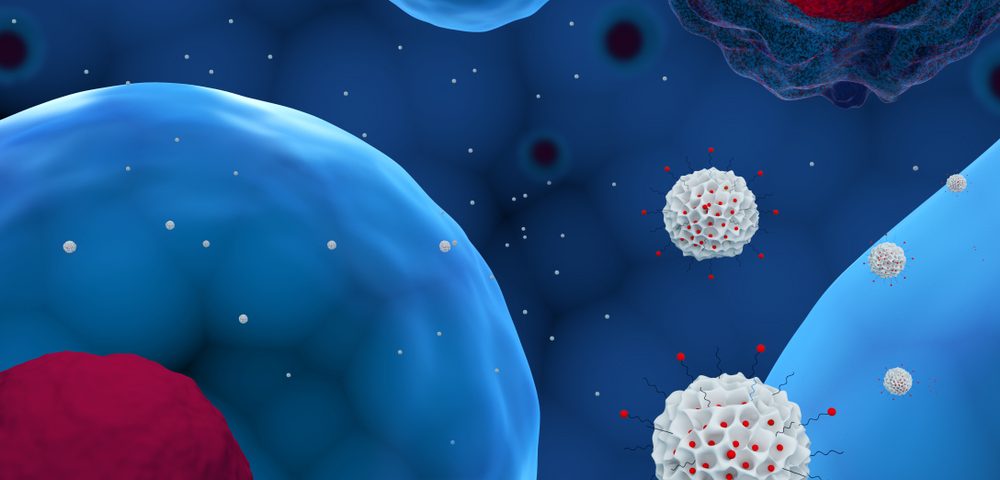BriaCell Therapeutics‘ immunotherapy candidate Bria-IMT was found to be safe and well-tolerated, and significantly reduced the size of metastasis in two of the six breast cancer patients treated in a Phase 1/2 study, early trial data show.
These results will be shared in the presentation, “SV-BR-1-GM a whole-cell targeted immunotherapy for breast cancer: Preliminary clinical data,” part of the the 2018 American Society of Clinical Oncology (ASCO) Annual Meeting, running from June 1-5 in Chicago.
Bria-IMT, also called SV-BR-1-GM, is a potential immunotherapy made of a breast tumor cell line engineered to release a factor – called granulocyte-macrophage colony-stimulating factor (GM-CSF) – that activates the immune system with a goal of increasing its ability to recognize and kill tumor cells. The therapy is given via an intra-dermal (skin) injection. The cells in the therapy are unable to replicate inside the body.
Data from a Phase 1 pilot study (NCT00095862), showed that patients with stage 4 breast cancer experienced substantial regression of breast, lung, and brain metastasis following Bria-IMT injection, in addition to treatment with cyclophosphamide chemotherapy and interferon alfa.
The ongoing Phase 1/2 study (NCT03066947) is a single-arm, open-label study\to evaluate Bria-IMT’s safety when injected into patients with recurrent and/or metastatic breast cancer. Additional – secondary – outcomes include the treatment response and the durability of responses.
Participants are treated with low-dose cyclophosphamide delivered two to three days prior to Bria-IMT. Each patient will receive 20 million cells, injected into four sites in the thighs and upper back.
Two and four days after Bria-IMT’s injection, patients are injected with interferon-alpha 2b (IFN-α2b) into each inoculation site to provide an additional “danger signal” that activates the immune system.
This treatment will be repeated every two weeks for the first month of treatment (three inoculations), and then every month for up to one year.
Researchers will present the results of the first six patients enrolled. Two have received one cycle of the therapy, two have gone through two cycles, and one six cycles and another received eight cycles. (The trial, which is still recruiting at four U.S. sites, plans to enroll 40 people with recurrent and/or metastatic breast cancer.)
Responses were seen in two patients. The first had failed to respond to seven prior chemotherapy regimens and received eight cycles of Bria-IMT. After three months on the therapy, imaging scans showed a virtually complete regression of all 20 identifiable metastasis in the lungs. The response was maintained at month six, but the patient was removed from the trial due to disease progression in the liver and bone.
A second patient had gone through three previous chemotherapy/biological treatments. This patient showed a marked regression of skin metastasis after two cycles, but the disease progressed in the lungs and heart. The patient went into cardiac arrest and died.
A third patient withdrew from the trial after two cycles due to worsening of breast inflammation.
Results so far show no serious or unexpected adverse events, with local injection-site irritation being the most common toxicity.
Treatment has started in another seven patients, and further interim data is expected toward year’s end, BriaCell announced in a press release.
Researchers highlighted that patients responding to Bria-IMT matched Bria-IMT’s specific immune-profile, a collection of molecules – called human leukocyte antigen (HLA) – that are involved in starting an immune response.
Researchers are investigating whether HLA matching – a procedure that tests whether the patient carries the same profile of HLA as the therapy – can be used as a potential predictor of patient response.
Additionally, patients whose disease progressed during the Phase 1/2 trial may be eligible to enter in a rollover study (NCT03328026) that will test Bria-IMT in combination with other immunotherapies, namely Keytruda (pembrolizumab) or Yervoy (ipilimumab). Treatment will be delivered in three-week cycles and patients will be monitorized for treatment response every 8-12 weeks.
BriaCell is also developing Bria-OTS, an off-the-shelf personalized immunotherapy (pre-manufactured cell lines) for advanced breast cancer, potentially covering roughly 90 percent of the patient population. After determining the HLA type of each patient, researchers will select the Bria-OTS that matches the immune profile.
“The inclusion of BriaCell’s clinical data in the proceedings of such a prestigious meeting lends important support to our hypothesis that Bria-IMT’s unique mechanism of action may shrink tumors in breast cancer patients who match HLA Class II molecules with Bria-IMT. The findings also provide a strong rationale for the development Bria-OTS,” William Williams, BriaCell’s president and CEO, said in the release.

